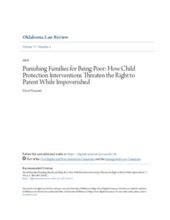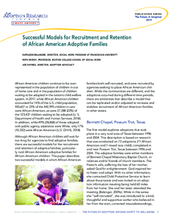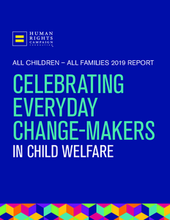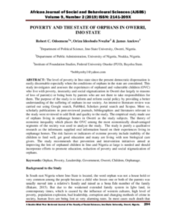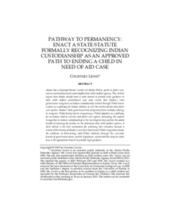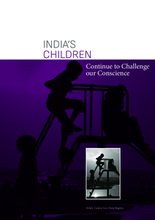Displaying 201 - 210 of 498
The current study explores how historical trauma has impacted American Indian tribes' trust in today's US public child welfare agencies.
This paper discusses critical tasks facing adoptive parents of transracially adopted persons (TRAs), what we know about parents’ role and children’s outcomes.
Sri Lanka's National Policy on the Alternative Care of Children outlines a comprehensive range of alternative care options and encourages the reforming of all formal structures that provide at-home and out-of-home services for children deprived of care and protection or at risk of being so. This policy also extends to children under care of the Juvenile Justice System. It provides policy solutions to programming for children at risk of family separation and facing deprivations such as child abuse, neglect, child labor, poverty, addiction, imprisonment, human trafficking, mental and physical disabilities, HIV/AIDS, domestic violence, orphanhood, abandonment and displacement etc. The policy also takes into consideration and encompasses provisions to children who are forced to live and work on streets.
This snapshot provides a brief overview of research examining culturally attuned ways to assess risk so that Indigenous children in Australia can be safely supported.
This article from the Oklahoma Law Review explores the US child welfare system and the practice of family separation of poor families.
This paper describes two successful models in which African American families both self-recruited, and were recruited by agencies seeking to place African American children.
This report highlights more than 70 child welfare agencies across the United States that partnered with the Human Rights Campaign Foundation’s All Children - All Families project to improve the services they provide to the LGBTQ community, including children in foster care and prospective foster and adoptive parents.
This study investigates and assesses the experiences of orphaned and vulnerable children (OVC) who live with poverty, insecurity and social stigmatization in Owerri due largely to reasons of loss of parent(s) or being born by parents who are not there to take responsibilities for them. The purpose of the study is to inform and reform social policy by providing a better understanding of the suffering of orphans in our society.
This article argues that the US state of Alaska should enact a state statute to provide clear guidance to state child welfare practitioners and state courts that Alaska’s state government recognizes an Indian custodianship created through Tribal law or custom as a pathway for Indian children to exit the overburdened state foster care system.
This report, which is also the fifth in the series, reflects on how children and the realisation of their rights continue to challenge our conscience even today.




